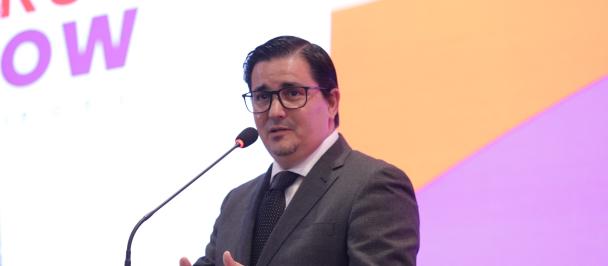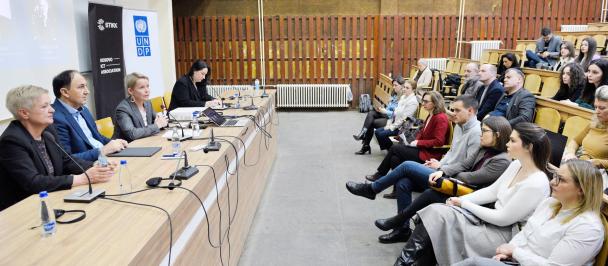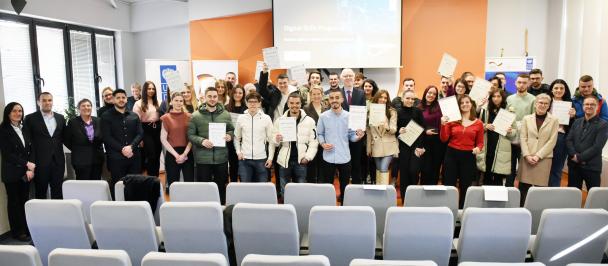Opening Speech by Maria Suokko, Resident Representative, UNDP Kosovo
Integrating Gender Perspectives into Climate Change Policies and Programmes in Kosovo: The Need for Data and Gender-disaggregated Data
June 27, 2022

Dear Participants,
I would like to thank you for joining us today to discuss the importance of data in designing gender responsive climate policies and programmes.
This initiative is part of UNDP’s Climate Promise Project, financed by the Government of Japan. Today’s discussion is the second in a series of the three discussions with the intent to bring together a diverse set of stakeholders and extracting good examples and recommendations on how to best integrate gender perspective to the climate agenda in Kosovo. Thank you for being part of this discussion!
Our Planet is getting warmer, the average temperatures have been consistently increasing in the past 100 years. So far, 2020 has been the hottest year since the temperatures have been recorded in 1880. And we know that heat records are being broken all over Europe – and beyond - these days.
This has given rise to the frequency of extreme weather events - impacting people around the world. Western Balkans is not an exception, we are already feeling the impacts of climate change and these impacts will be felt even more as the frequency and intensity of heat waves, droughts, and extreme precipitation is expected to increase. This will have detrimental impacts on food security and quality, biodiversity, water security, and on our health and well-being.
The threats from climate change are imminent and impacting our lives already. Climate action requires that we act to reduce the emissions that cause climate change and on strengthening our capabilities to respond to the adverse effects of the changing climate.
These adverse effects, however, will impact regions and people differently. The poor and those living in the margins will be disproportionately affected due to the existing social inequalities. Those who live in poverty, tend to largely rely on agriculture and seasonal jobs for survival. Extreme weather events impact crop yields and can have a detrimental impact on livelihoods.
Women tend to be poorer than men. Rigid gender and social norms still prevent women from enjoying equal access to economic resources and education. Women are also less likely to be involved in decision-making in the households, and communities at large. As a result, their needs and perspectives are often overlooked - when it comes to design of climate policy and intervention. This is unfortunate because such policies not only fail to deliver for half of our society, but they also omit valuable insights and knowledge that women possess in this area.
It is critical that gender perspective is integrated in the climate agenda. Gender perspective must be embedded in climate action to strengthen the effectiveness of green transition – particularly, the initiatives that relate to the labor market, energy, transport, construction, and food production. This includes promoting equal access in decision-making processes on climate action - to ensure important contributions by underrepresented people and women in their wide diversity, as experts, decision-makers, consumers, careers, educators and stakeholders. But also, to ensure creation of inclusive, green jobs and educational opportunities. Focus should be on reducing the vertical and horizontal gender-segregation in the labor market, especially in STEM (science, technology, engineering, math) education and employment. This is an area where UNDP in Kosovo is also working.
Inclusive climate change policies that integrate gender perspectives should be based on evidence - and access to data is key to ensuring this. We need to ensure access to quantitative data disaggregated by gender to understand how women and men make their livelihoods, respectively. To understand access to natural resources, and natural resource consumption patterns. Ensuring access to qualitative data is equally important. It is through qualitative data that we are able to get an insight into how location-specific norms and power relations shape the lives of women and men, respectively, and what this means for designing gender-responsive climate policies.
UNDP is at forefront of global efforts to help countries around the world to combat climate change and respond to the challenges it causes. Over 80% of our climate change programmes globally contribute to gender equality and empowerment of women.
In Kosovo, we are supporting the municipalities of Prizren and Suharekë/Suva Reka in their municipal climate action with strong focus on integrating gender perspective into the planning and decision-making processes. Our goal is to work closely with local and central institutions, communities, research institutes, and private companies to ensure evidence-based and gender-responsive climate action.
We are committed to drawing on both the global and local experience in supporting Kosovo institutions in their efforts to integrate gender perspectives in policy-making and programmes. The key is to ensure availability of data. It is only through this integration that we can ensure improved well-being for all members of the society, irrespective of their gender.
Thank you!

 Locations
Locations


